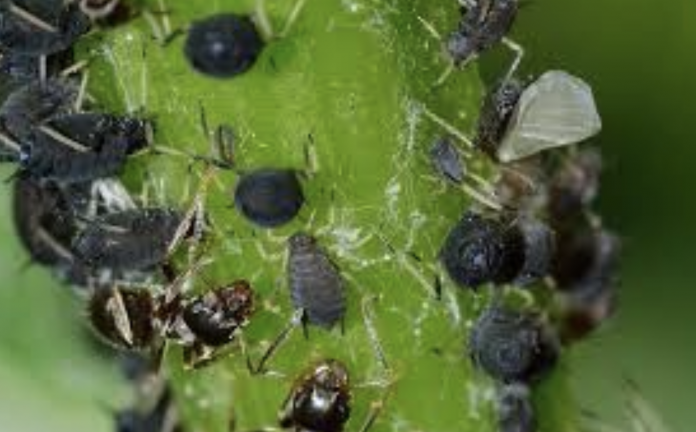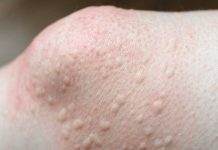There are approximately 4000 kinds of aphids and only 250 of them are labeled as harmful. Aphids are one of the most well-known garden pests because they can be found in almost every garden around the world. Aphids prevent plants from thriving because they suck out all of the nutrient-rich sap from the plant preventing it from getting to the nutrient-hungry parts of the plant, and aphids can carry viruses which means that they can infect the plants with the carried viruses that are often lethal to plants like grains, potatoes, and citrus fruits. Another thing that happens because of aphids is the sooty mold that coats the plant leaves which eventually prevents them from being exposed to sunlight.
An apid infestation can begin slowly but as soon as they start reproducing, colonies will start appearing and they can take out your whole garden very quickly if you don’t act, that is why you use one or multiple methods from the following list below.
1. Physical Removal
If the infestation is at its beginning phase, you can remove aphids by hand. Simply wear a pair of gardening gloves and start pinching the insects from your plant’s stems and leaves. However, if the pests are contained to a couple of branches, make sure to prune off the infected sections and put them in a bucket full of soapy water to kill the bugs.
2. Water Pressure
You can use your garden hose to spray the annoying bugs off your plants. This method lets you control small aphid colonies, but you should be careful not to use this method on fragile and young plants because you can harm and potentially destroy them. Make sure to use this method on strong and robust plants.
3. Soap and Water
Mild household detergents are very effective when it comes to getting rid of aphids. Simply dilute a couple of teaspoons of dish soap in a bucket full of lukewarm water. Once done, pour the solution in a spray bottle and start spraying the solution on the infested plants. This method is used by many experienced gardeners because it does not harm the plants and it kills aphids easily, and make sure t spray the bottom side of leaves because that’s where aphids usually lay their eggs. However, you should know that this method can also be lethal to useful insects like hoverflies, lacewings, and ladybugs. Use this method with caution because killing useful plants will cause problems that you can hardly deal with in the future.
4. Neem Oil
Mix neem oil with water, then pour the solution in a spray bottle and start spraying the affected plants. This method is very beneficial for your garden because it does not repel aphids only, but other harmful pests like beetles, mealybugs, ants, cabbage worms, caterpillars, and leafminers. Furthermore, neem oil can also control the spread of the fungus that attacks plants. However, this method also has its downside because neem oil can also repel beneficial insects, with that in mind, use this method carefully.
5. Essential Oils
Mix equal parts of peppermint essential oil with rosemary, thyme, and clove essential oils equally (recommended amount: 4 to 5 drops), then pour the mixture in a spray bottle that contains water and start shaking to mix the previous mixture with water and start spraying the affected plants. This blend is awesome because it kills almost every garden insect pest and their larvae and eggs. This method is safe for indoor use as well.
6. Insecticidal Soap
Insecticidal soap treatments for garden pest control are countless, but before using them you should read and follow the instructions that come with them carefully to avoid harming beneficial insects that live in your garden.
7. Beneficial Insects
Beneficial insects are crucial when it comes to dealing with aphids. Insects like ladybug beetle or ladybird can be highly effective and can help you get rid of the annoying pests. You can buy these bugs from almost any farming and gardening equipment supplier. Other bugs that you should consider getting are the hoverfly larvae and green lacewings because their favorite snacks are aphids. Unfortunately, hoverflies should be naturally attracted to your garden. Planting oregano, garlic, and catnip can help you attract the overflies. If you want to naturally attract lacewings and ladybugs, make sure to grow dill, yarrow, clover, fennel, and mint or simply one or two of the mentioned plants.
8. Bug-eating Birds
On top of getting beneficial insects, a similar and effective method is encouraging titmice, wrens, and chickadees to nest around your yard or garden because they are labeled as bug eater and will help you get rid of aphids. You can attract them by offering food and space for them to live. You should keep in mind that these birds love nesting is small trees and shrubs that have dense foliage because it helps them hide from other predators. To attract aphid preying birds, consider planting privet, boxwoods, or arborvitae. You can also fill a small bird feeder with seeds like nut hearts, black oil sunflower seeds, pre-hulled seeds, and nuts. This way you will attract the birds and they will stay in your garden to feed on the aphids.
9. Repel Ants
Make sure to repel ants off your garden because they usually protect aphid colonies from predators. When you get rid of ants that protect the colonies you will offer great help for the beneficial insects and aphid-eating birds. Click here to find out how to get rid of ants.
10. Natural Repellents
Make sure to plant garlic and onions because aphids absolutely hate them. Simply grow those plants all over your garden to repel aphids and to prevent them from settling down in your garden.
11. Natural Attractants
This method may seem odd but it definitely works. Choose an area a bit far from your plants and grow asters, zinnias, cosmos, and dahlias in it to make aphids infect them instead of your beloved plants. This method is very effective because it also makes birds and predators reasons to stay because they’ll be keeping an eye on the aphids in case they decided to pay a visit to your plants.










